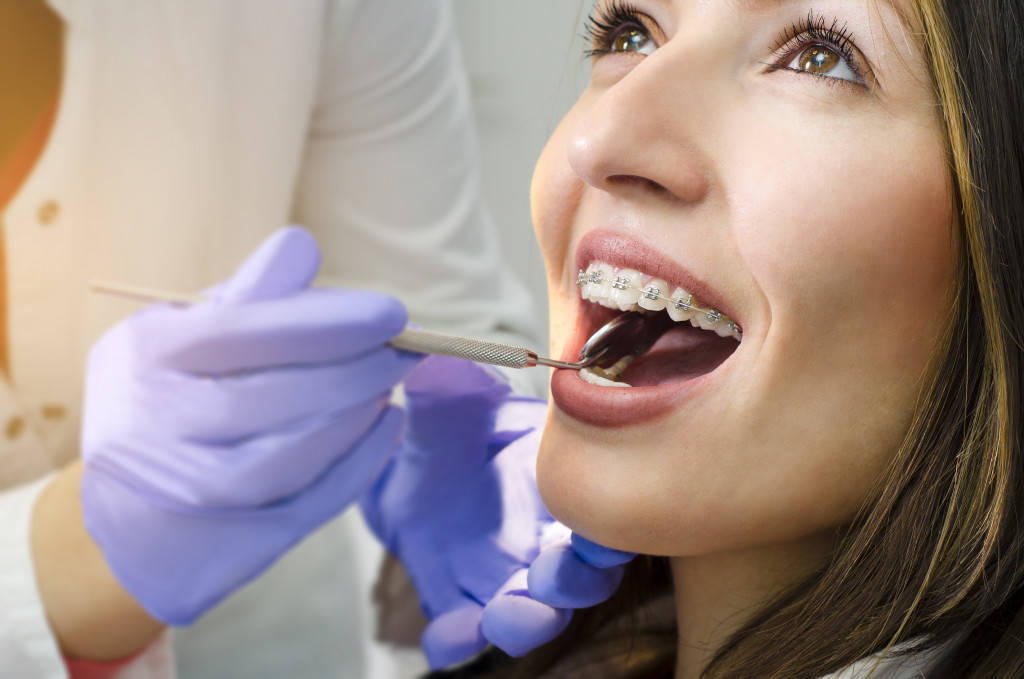- Gum disease is caused by the accumulation of plaque and tartar on the teeth, leading to inflammation and infection.
- Tooth sensitivity is when the durable enamel on your teeth wears down, exposing the dentin underneath.
- If left untreated, a dental abscess can cause intense pain, swelling, and fever
- Dental erosion is caused by direct contact with acidic substances such as carbonated drinks or fruit juices.
- If left untreated, a dental abscess can cause intense pain, swelling, and fever.
Caring for dental health is crucial for maintaining a beautiful smile and overall well-being. Dental problems can be painful and costly, making prevention and early detection essential. This guide will explore five common dental problems you should be aware of to ensure your oral health remains in top condition. From gum disease to tooth sensitivity, understanding these issues will empower you to take the necessary steps to protect your teeth and gums.
1. Gum Disease
Gum disease, also known as periodontal disease, is a prevalent dental problem that often goes unnoticed in its early stages. It is caused by the accumulation of plaque and tartar on the teeth, leading to inflammation and infection of the gum tissue. Symptoms, known as gingivitis, might be mild in their initial form, such as red and swollen gums that bleed easily. However, if left untreated, it can progress to advanced periodontitis, causing irreversible damage to the bone and supporting structures of the teeth.
To prevent gum disease, maintain a diligent oral hygiene routine that includes brushing your teeth at least twice daily, flossing daily, and visiting your dentist for regular check-ups and cleanings. If you notice any signs of gum disease, such as persistent bad breath, receding gums, or loose teeth, seek professional dental care promptly to address the issue before it worsens.
2. Tooth Sensitivity

Tooth sensitivity is a common dental concern that can cause pain or discomfort when drinking or eating hot, cold, sweet, or acidic foods and beverages. It occurs when the durable enamel on your teeth wears down, exposing the dentin underneath. Dentin contains tiny tubules that lead to the tooth’s nerve, making it sensitive to external stimuli. Abrasive brushing, acidic foods, tooth grinding, and gum recession can contribute to enamel erosion and tooth sensitivity.
To manage tooth sensitivity, use a soft-bristled toothbrush and gentle brushing techniques to avoid further enamel wear. Your dentist may recommend desensitizing toothpaste or fluoride treatments to strengthen the enamel and reduce sensitivity. It is also essential to limit the consumption of acidic and sugary foods, and if you have a teeth-grinding habit, consider using a mouthguard at night to protect your teeth from further damage.
3. Tooth Decay
Tooth decay, or dental caries or cavities, is one of the most widespread dental problems globally. It occurs when the bacteria in your mouth feed on sugars and starches, producing acids that erode the tooth’s enamel. This leads to small holes or cavities on the tooth surface. If left untreated, tooth decay can progress deeper into the tooth, causing pain, infection, and the need for more extensive dental procedures.
Here are some tips to prevent tooth decay:
Practice Good Oral Hygiene
Good oral hygiene is essential for preventing tooth decay. Maintain optimal oral hygiene by brushing your teeth with a fluoride toothpaste at least twice a day, and make it a habit to floss between your teeth daily. This simple yet effective routine will help ensure a healthy and radiant smile. Toothbrush bristles should be soft enough not to damage the enamel, so look for brushes with the ADA seal of approval on them. Additionally, consider using an antibacterial mouthwash to reduce bacteria and help prevent cavities.
Eat a Healthy Diet

What you eat plays a major role in keeping your teeth healthy and strong. A balanced diet rich in fruits, vegetables, and calcium helps protect against tooth decay by providing vitamins and minerals that create an environment hostile to bacteria that can lead to cavities. Moreover, try to limit your sugar and acid intake as much as possible since they work together with bacteria to weaken the enamel on teeth.
Regular Dental Check-Ups
Regular dental check-ups are an important part of preventative care for tooth decay. During these visits, your dentist will inspect your teeth and mouth for any symptoms of decay and discuss any lifestyle changes that might help reduce the risk of developing cavities in the future. Ensure you keep up with your regular appointments—it could save you from discomfort later!
Teeth Replacement
Losing a tooth can significantly affect your ability to chew, speak, and smile confidently. It also impacts your oral health, leading to further tooth loss, bone loss, and other dental problems. One effective solution to this issue is investing in high-quality traditional dental bridges, a widely trusted method for teeth replacement. Traditional dental bridges are dental prosthetics consisting of two dental crowns anchored between a false tooth or pontic tooth. Traditional dental bridges blend seamlessly with your natural teeth, improving your smile’s appearance and functionality.
4. Dental Erosion
Dental erosion is the gradual loss of tooth enamel due to direct contact with acidic substances. Unlike bacterial acids involved in tooth decay, dental erosion is caused by external acid sources, such as carbonated drinks, fruit juices, and certain acidic foods. Acidic erosion can also result from conditions like acid reflux or gastrointestinal issues, which introduce stomach acids into the mouth.
Preventing dental erosion involves minimizing exposure to acidic substances and practicing good oral hygiene. When consuming acidic foods or drinks, use a straw to reduce contact with teeth and rinse your mouth with water afterward. Avoid brushing your teeth immediately after consuming acidic substances, as this can further weaken the enamel. Instead, wait for at least 30 minutes before brushing. If you suffer from acid reflux or have a history of gastric issues, seek medical advice to manage these conditions effectively.
5. Dental Abscess
A dental abscess is a severe and potentially dangerous dental problem when a bacterial infection forms within the tooth or the surrounding gum tissue. It typically results from untreated tooth decay, advanced gum disease, or dental trauma. A dental abscess can cause intense pain, swelling, and fever and even spread the infection to other body parts if left untreated.
If you suspect you have a dental abscess, seek immediate dental care. Your dentist may need to drain the abscess and prescribe antibiotics to clear the infection. To prevent dental abscesses, maintain excellent oral hygiene, and promptly seek dental attention if you experience any signs of tooth decay or gum disease.
In Closing
Awareness of these five common dental problems empowers you to protect your oral health proactively. Remember to practice good oral hygiene, maintain a balanced diet, and schedule regular dental check-ups. By staying vigilant and addressing dental issues early on, you can ensure your smile remains bright and your teeth and gums stay healthy for years. Remember, prevention is always better than cure for your dental health.











